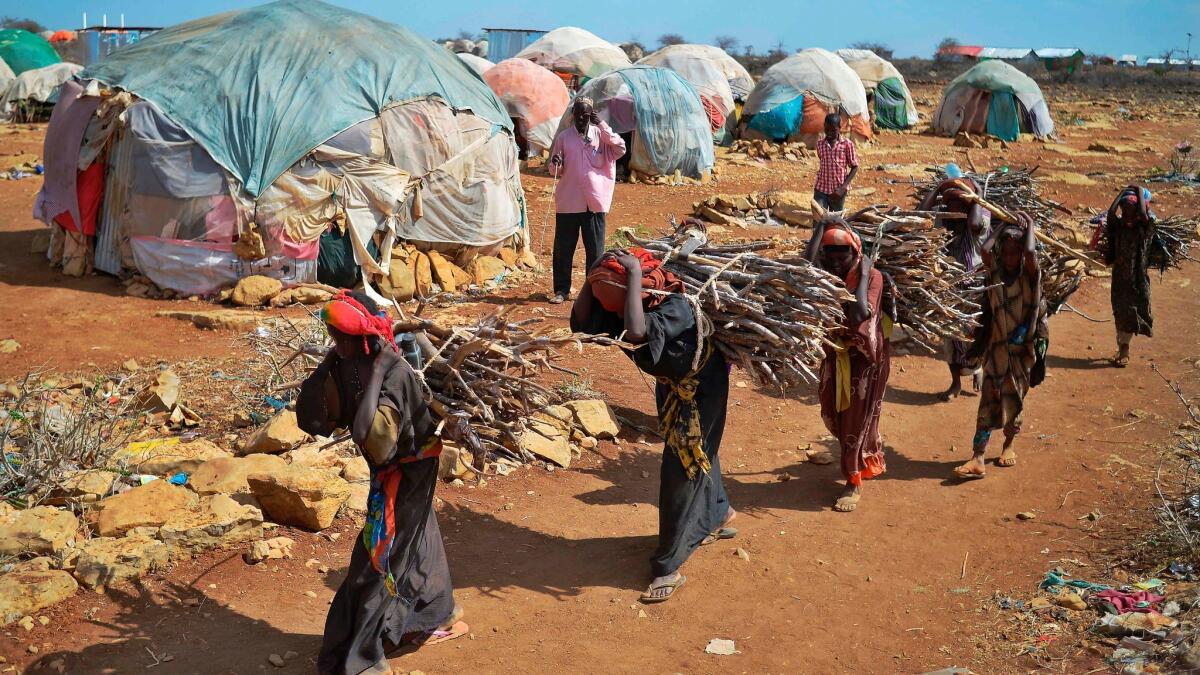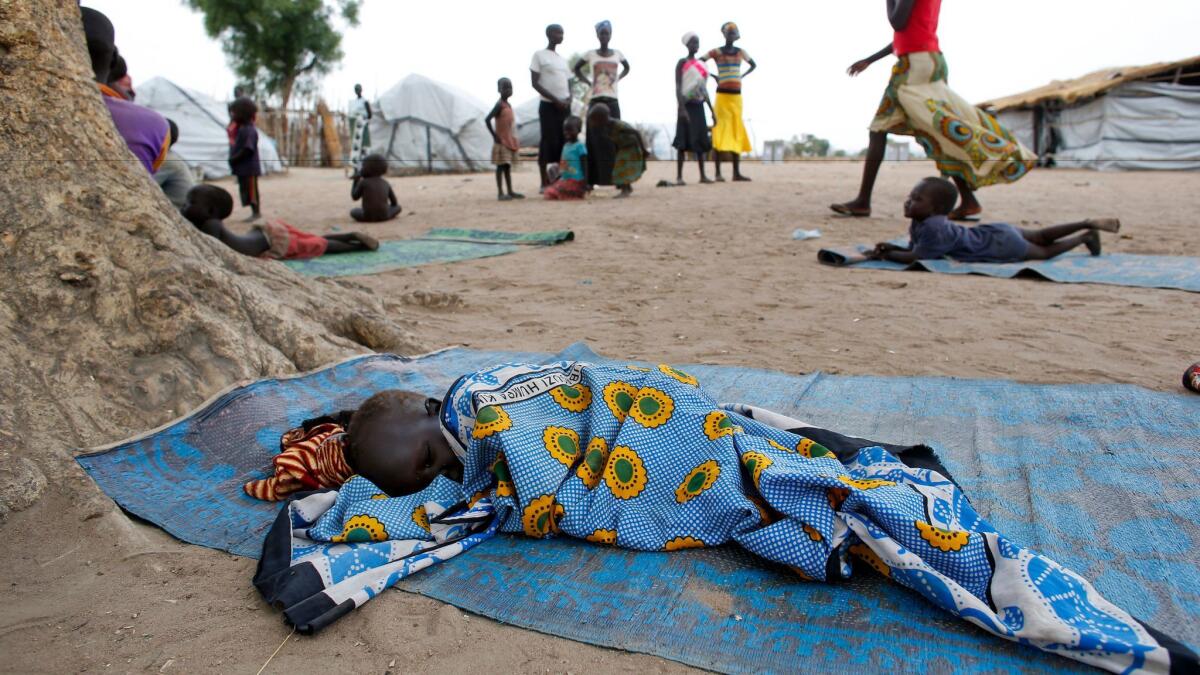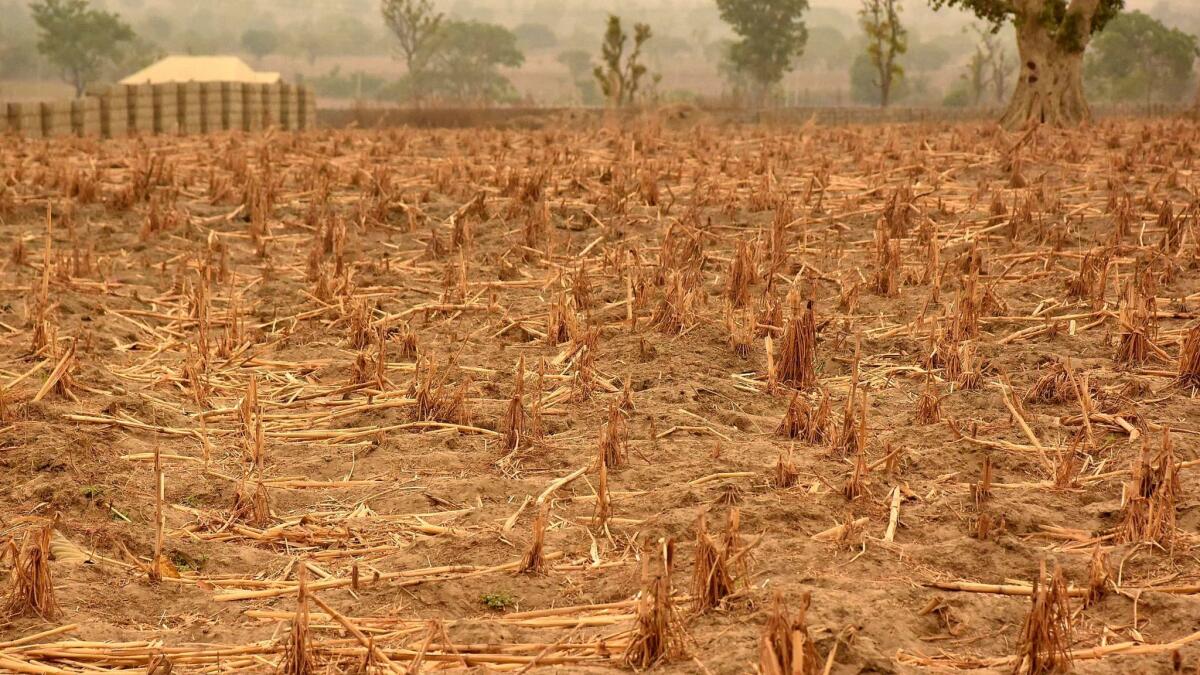U.N. warns of famine in Africa and western Asia as it seeks billions of dollars to prevent catastrophes

In a race against time to prevent four famines in Africa and western Asia, the U.N. and its humanitarian agencies need to raise $5.6 billion, fast.
The United Nations had raised just $90 million — 2 cents for every dollar it needs to provide food for those most in need — by the end of February, the latest available figures show.
The bulk of the money — $4.4 billion — is needed within the next week to help fight the crisis, David Orr, World Food Program spokesman, said Thursday at a Johannesburg news conference.
All four hardest hit countries, South Sudan, Somalia, Nigeria and Yemen, are affected by war, making it difficult for humanitarians to deliver aid to starving people.
In South Sudan and northeastern Nigeria, fighting has forced people to flee their homes, prevented farmers from planting and harvesting and cut trade routes, Somalia has been hit by severe drought, and Yemen has seen widespread destruction coupled with restrictions on imports of food and fuel.
The World Food Program, the food assistance branch of the U.N., alone needs $1.2 billion, including $472 million for Yemen, $286 million for Somalia, $232 million for northeast Nigeria and $231 million for South Sudan.
In the next two months, when the rainy season begins in South Sudan, the dirt roads are expected to turn to a quagmire, making it impossible for aid trucks to pass and leaving 60% of the country inaccessible.

Last month, the U.N. declared a famine in two counties in Unity State, South Sudan, affecting 100,000 people, areas hit hard for the past three years by successive hunger emergencies because of fighting and attacks. An additional 1 million people in South Sudan are facing a severe hunger emergency and the threat of famine.
Famines are also looming in Somalia, northeastern Nigeria and Yemen, with a total of 20 million people in dire need of food and medical assistance.
Drought has already uprooted 250,000 people in Somalia, according to Susannah Price, of the UNICEF office in Somalia. Many are abandoning rural villages where crops and animals have died, walking to major towns hoping to get access to food aid.
Experts are predicting that rains due in Somalia in coming months will be inadequate. The drought, the worst in decades, comes with warnings the El Nino phenomenon that triggered it could be repeated this year, with meteorological experts predicting at least a 55% likelihood of a rare event — back-to-back El Nino weather patterns.
If that happens, the result for countries in southern and eastern Africa could be devastating, with countries like Somalia already weathering successive years of drought, crop failure and livestock deaths.
“The severity of this drought is extreme,” said Challis McDonough, WFP spokeswoman in Nairobi, referring to Somalia. “If the rains fail in coming months, it will be the worst drought in 60 to 70 years. If those rains fail, as they are predicting, that is where we’re looking at the situation deteriorating, so we might move into famine.”
“In this case we are talking about some of the poorest communities on the planet, who are also affected by conflict and insecurity. The global crises are just so enormous, with these four crises and Syria and Iraq that it’s stretched the humanitarian community,” she said, referring the conflicts in Syria and Iraq that have seen millions flee their homes.
Price said even rains in Somalia will not solve the crisis.
“There are already too many people on the move. The animals are dying,” she said. “The animals used to produce the milk. Now they’re giving [children] black tea.
“The children are getting sick,” she said. “As water sources dry up, people go to unsafe water sources. That results in acute watery diarrhea or cholera. Both are life-threatening diseases.”

In South Sudan, myriad militias and government soldiers unleash attacks on civilian villages, killing men and raping women. People have fled into the bush, making it difficult for humanitarian agencies to provide help. At times, humanitarian compounds, where aid agencies store food, have been looted by militias.
“There’s a lot of guns and a lot of armed people and a lot of issues between communities,” McDonough said. “If there’s active fighting, we can’t go in helicopters and start throwing food out. It’s crucial that we are not drawing (people) out of the bush to give them food only to have them attacked for that food.”
Getting safe humanitarian access requires complicated negotiations with men from multiple armed groups, from commander level to community level, she said.
“We have got staff working around the clock on these issues. It’s not getting any easier,” McDonough said.
Earlier this month, South Sudan’s government, the second most corrupt on Earth, according to Transparency International, drew criticism when it announced it planned to charge foreign aid workers a $10,000 work permit fee, up from $100.
“In South Sudan, corruption isn’t an anomaly within the system; it is the system itself, the very purpose of the state,” according to a report the Enough Project human rights group released Tuesday. The report blamed greed, corruption and poor governance by the country’s leaders for the famine.
“War tactics include village burning, sexual slavery, burning of food stocks, denial of aid access, mass rape, forced conscription of children, and killing of civilians. Mass atrocities become routinized,” the report said. “In South Sudan today, war crimes pay. There is no accountability for the atrocities and looting of state resources, or for the famine that has resulted.”
McDonough said with multiple emergencies unrolling in Africa and elsewhere, hungry families in countries such as Kenya and Uganda, those facing dire food shortages — but not famine — have to survive on half the normal WFP emergency ration.
Twitter: @RobynDixon_LAT
More to Read
Start your day right
Sign up for Essential California for news, features and recommendations from the L.A. Times and beyond in your inbox six days a week.
You may occasionally receive promotional content from the Los Angeles Times.






